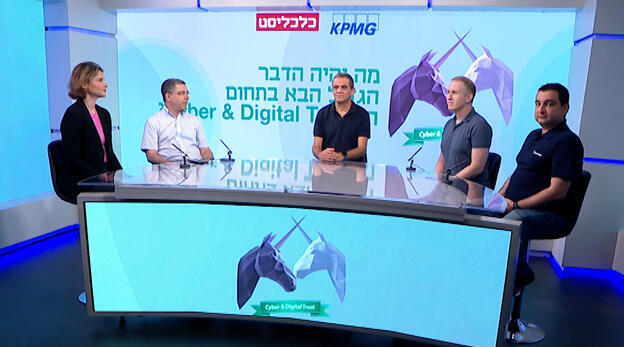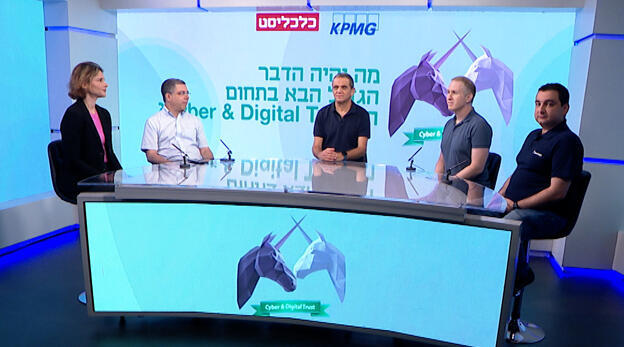
"Hackers are not interested in the recession. They just continue to attack and are becoming more and more sophisticated"
Arik Kleinstein, Founding Managing Partner of Glilot Capital, was speaking as part of a panel in ‘The Next Big Thing’ series alongside Panorays CTO Demi Ben-Ari, Dina Pasca-Raz, Head of Technology at KPMG Israel, and Yair Snir, Managing Partner at Dell Technologies Capital
With the tightening of budgets and the evolving sophistication of cyber attackers, the panelists at Calcalist's 'The Next Big Thing' panel, held in collaboration with KPMG, emphasized the continuous need for organizations to defend against cyber threats. The panel included Arik Kleinstein, Founding Managing Partner of Glilot Capital, Panorays CTO Demi Ben-Ari, Dina Pasca-Raz, Head of Technology at KPMG Israel, and Yair Snir, Managing Partner at Dell Technologies Capital.
While short-term budget constraints may impact valuations and fundraising capabilities, the long-term outlook remains promising for the cyber industry. Discussions also touched upon extending financial runway, the expansion of cyber attacks, and the potential of generative AI to revolutionize the field. As the industry navigates through challenging times, strategic investments and adaptation to changing market dynamics are crucial for success.
"Many companies are in a difficult situation, because in the end the budgets, even in the cyber world, are starting to get tight and in this situation you have to respond to the market," said Ben-Ari. "There are a lot of non-essential areas that you can cut back on."
Arik Kleinstein, Founding Managing Partner of Glilot Capital, which invests heavily in cybersecurity, added: "Hackers are not interested in interest rates, the recession and the economy. They continue to attack and are becoming more and more sophisticated, so the need for organizations, companies and governments to defend against cyber attacks has not disappeared. Yes, there has been a reduction in budgets. Before they were buying more because organizations wanted to protect themselves and were constantly looking for the next technology to help them be in the best position against attacks. Now, they do it in a much more measured way. In the short term we will see a tightening of budgets and this also affects the valuations of the companies and their ability to raise money, but in the medium and long term the cyber industry will continue to receive investments."
Dina Pasca-Raz, Head of Technology at KPMG Israel, gave an overview of the situation, saying, "I think the order of the day, especially in the last six months, is to extend the time you can manage with the money you have, so as not to be in a position where you need to raise capital when you are very stressed and when the market is really bad. Don’t fundraise when you’re in the red. On a global level, we see that cyber attacks have expanded significantly, even in Israel many startups are focusing on addressing a wide range of cyber threats. The field of cyber insurance, which sometimes stalls transactions, is developing into some sort of interface between fintech and cyber. So we are seeing an ecosystem and the demand will not decrease. Right now the money supply has dropped dramatically because of the macroeconomic situation. The system is out of balance, but someday it will return."
According to Yair Snir, Managing Partner at Dell Technologies Capital, "The industry as a whole is going through a process of disillusionment that has not yet ended because we are still in the midst of it. It started during Covid, when there was an excess of capital and acquisitions. If a year or two ago it was easier to sell and it was possible to work even with a not completely tight GTM strategy, today there is no room for compromise. As an investor you want to see a team that knows what they are up against. I will cautiously say that the investments that will be made in the next two years will probably be the best exits in the next decade. This is actually the time to invest."
Regarding the question of whether there is anyone to invest in, Snir answered: "Lots of entrepreneurs come to us. Not like before, but there is still a core of quality entrepreneurs here, coming from companies which became unicorns, went public or closed. There are opportunities, but investors are more selective."
Ben-Ari discussed how difficult it is to raise money today, but noted that "companies that succeed in raising funds will be stronger and we will be there. Everything is getting slower and we take that into account. We need to be flexible, adjust the value proposition of the product, tell the right story, even go to markets we have not been to. Even if we are used to doing deals for hundreds of thousands of dollars, now we need to also generate transactions of $50,000 and less in order to grab more market share and not kill a potential market."
Generative AI is going to change the whole field according to Pasca-Raz who noted that "In the meantime, there is a lot of talk and there is no doubt that this is the next thing, but the process of assimilation at a deep level will take time. It's something that worries all industries, but it will also affect cyber."
Kleinstein concluded by saying that "This is a horizontally disruptive technology. It is going to affect the entire world of software and, therefore, the entire business world. All business functions, all business processes are going to be affected."














